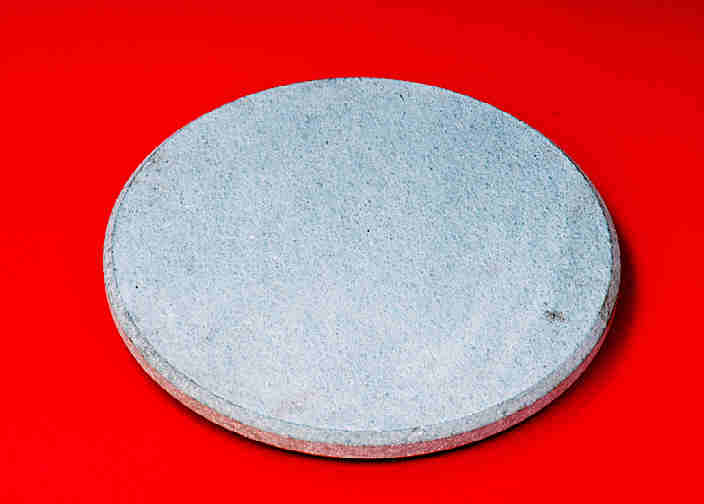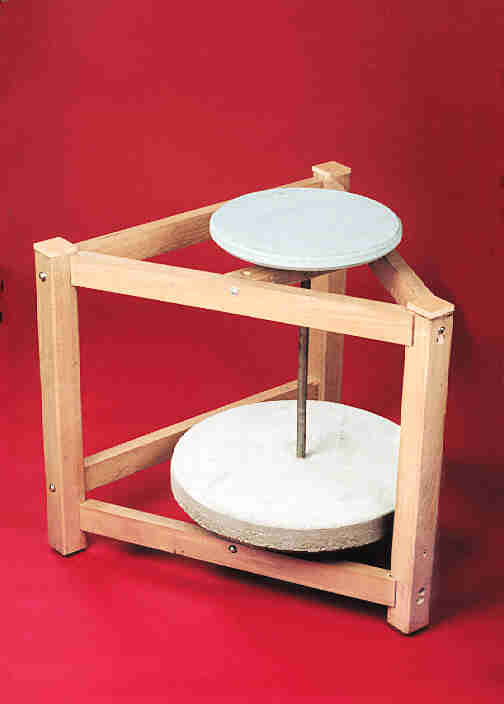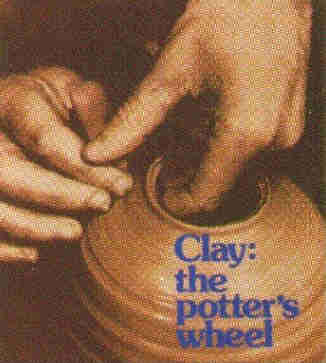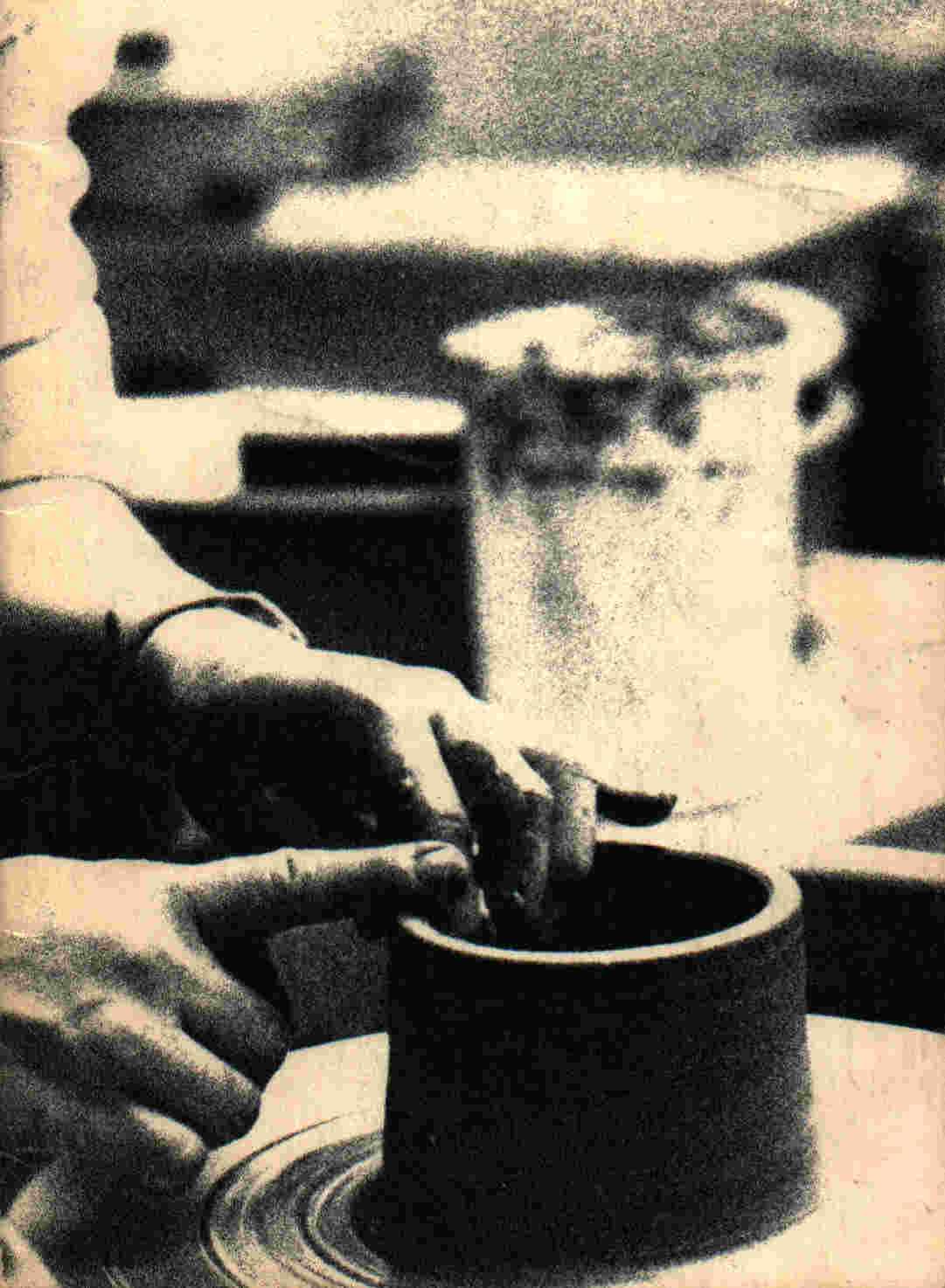"In
the hands of the Potter"
Message preached September 9,
2001
Long Green Valley Church of the Brethren
Glen Arm, Maryland USA
based upon Jeremiah
18:1-11, Psalm 139:1-6,13-18, and Philemon
Order
of Worship
Let me begin by thanking the Nurture commission and, in particular, the
Sunday School subcommittee for what they do to make the educational ministry of
our congregation possible. Much happens behind the scenes, as we try to give
shape to this vital task of the church. Passing on the faith is no small matter.
Helping to mold growing disciples into the likeness of Christ is, perhaps, our
most important mission - alongside sharing the good news and inviting people to
come and see what God is all about. This isnít mere "work," not just
a "job" that has to be done. This is "ministry." This is a
mission, a great commission. "Making disciples" (Matthew
28:19) is what teachers and mentors, and those who support them, are
all about.
Of course, as we are slowly discovering, each person learns (and thus grows
as a disciple) in their own unique way. Teresa Albright, our Nurture chairwoman
(herself a retired schoolteacher), has been making us more aware of these
various styles of learning. When I flew past her the idea of using
"play dough" in worship today, she jumped at it, for she is
herself a very "tactile" learner. Having something in hand helps her
to better grasp things that arenít easy to comprehend. "It sticks with
me," she says. Many of us learn in the same way, while others may be more
visual learners - having to see something before it sinks in - and still others
understand better what they hear, as opposed to sight and touch. Singing out the
faith into which we are growing is yet another way of learning, one of many.
This image God shared with the prophet Jeremiah is so captivating because it
draws us in through many doors. Going "down to the potterís house"
with Jeremiah (18:2), I can almost hear, as I approach,
the sound of the wheel upon which the clay is shaped. Mind you, this is no
electrically driven tool. In days past, the potterís wheel was really a wheel
upon a wheel. At the  potterís
feet was a large stone disk laid sideways like a turntable on an old
record-player. A center shaft from this wheel would hold up another wheel at the
level of the potterís hands. The momentum of the bottom wheel upon a pivot is
what spun the top wheel, where the work of the potter took place.
potterís
feet was a large stone disk laid sideways like a turntable on an old
record-player. A center shaft from this wheel would hold up another wheel at the
level of the potterís hands. The momentum of the bottom wheel upon a pivot is
what spun the top wheel, where the work of the potter took place.
A good deal of foot power was required to get the bottom wheel spinning, as
heavy as it was. But once it was started, especially if it was well balanced, a
regular foot tap was all that was needed to keep it going. Can you  hear
the slight grinding sound of the wheel spinning, the periodic push of the foot?
hear
the slight grinding sound of the wheel spinning, the periodic push of the foot?
Pottery is a very "hands-on" endeavor. Much is done "by
feel," whether it is judging the composition of the clay before it is used,
sensing itís inner properties - what it may be capable of becoming, what air
pockets or other faults might be unseen within, or "throwing" the clay
onto the wheel and manipulating it by hand. The quality of the pottery depends a
great deal upon how well the clay is thrown. If it is thrown off-center, or if
it is not put down with enough force to make it seal onto the wheel, it just wonít
work. Of course, even before that crucial moment the clay will have needed just
the right amount of preparation - adding enough water to make it moldable, but
not too much or it will become a pancake rather than a pot upon the wheel.
Can you feel the touch of hand and clay? Can you see the potter at work? The
wheel spins and slowly a lump of clay becomes something more. Thumbs shoved down
into the middle create a cavity within. Palms shape a growing outer wall. The
pressure of fingers and thumbs mold a design, by touch sensing what the clay
will become. When all is done, the wheel stops spinning, and a decision is made.
Will the pot survive the kiln, where it is to be baked, or will some flaw cause
it to explode or otherwise break in the process - maybe destroying other pots
along the way?
If the potter determines that the pot is defective, the clay is tossed. But
donít worry, it is not lost, for with that same clay the potter will try
again. However, if the pot looks and feels right, it is carefully separated from
the wheel with a string and placed on a shelf to dry, until ready to be baked
and later coated with protective sealant and paint, followed by more baking.
Even after it goes through these other stages, though, a pot may crack or break.
All is not lost, however, for it can be remade even then. Such pieces can be
completely ground up and mixed with water to make new clay, ready for the potterís
hands.
 Jeremiahís
vision of the potterís house was intended for a generation that needed to be
remade, for there were so many flaws, so many broken edges, so many cracks, that
when the "heat" of that day and age turned up - the times of testing
that are part of life - there would be a great deal of damage. The rich and
powerful had grown so self-indulgent, ignoring the needs of others, forgetting
who they were - and more important, forgetting whose they were -
that they were self destructing and destroying everything in the kiln. The time
had come, God told Jeremiah, for the clay to go back to the wheel, to be
reshaped by the master potter.
Jeremiahís
vision of the potterís house was intended for a generation that needed to be
remade, for there were so many flaws, so many broken edges, so many cracks, that
when the "heat" of that day and age turned up - the times of testing
that are part of life - there would be a great deal of damage. The rich and
powerful had grown so self-indulgent, ignoring the needs of others, forgetting
who they were - and more important, forgetting whose they were -
that they were self destructing and destroying everything in the kiln. The time
had come, God told Jeremiah, for the clay to go back to the wheel, to be
reshaped by the master potter.
I love this image, for it helps me to understand some things about God, and
about us altogether, and about myself. God, you see, is like a potter at work
with clay upon a wheel. Godís hands "feel" us out, they know what we
are made of, what lies within. The 139th
Psalm opens the door to our awareness of how well God knows us. Deeper than
the surface, thatís for sure! Longer than we dare imagine, living as we do in
this particular moment in time. Godís knowledge of us, all of us together, and
each of us individually, is more intimate than any intimacy we have in this
life. We donít even know our own selves as well as God knows us. Thatís both
frightening and comforting. We canít escape God. Oh, no! Oh, YES!
This image of the potter also helps to make some sense out of events that may
seem to make little sense. Even when we struggle to think that God has anything
to do with what happens around us, there is an overwhelming affirmation in this
scripture which says that the master potterís hand is at work. As we feel
thrown about by various forces in life, knowing that there is a larger potterís
wheel involved helps. The challenges of life may be part of Godís process of
throwing the clay upon the wheel and shaping it into a vessel of great beauty
and purpose.
Like, for instance, the rough and tumble years of adolescence, when our
physical and emotion form changes almost overnight - does it help to see even
this experience as "potterís wheel time?" I believe so. Mentors, by
the way, help youth become aware of this bigger picture - their very presence,
standing with a young person through all the change, speaks more than words can
convey.
The truth is, we all are being shaped by the master potter, not just those
who are of younger years. Sometimes we speak of education (Christian or
otherwise) as if teachers are the potters and students are the clay. The reality
is, teachers and students are all upon the potters wheel. The same is true of
mentor and youth. Godís hands are upon us all, shaping us into earthen
vessels, jars of clay that overflow with Godís power, Godís goodness and
mercy, Godís love, Godís righteousness, Godís holiness, Godís Spirit - a
treasure to be shared (2
Corinthians 4:7).
If we look, listen, touch, even taste and smell, with our developing
spiritual senses, the hand of the potter becomes evident all around us, as well
as upon us. Scripture is permeated with the touch of the potterís hand. Like
the glimpse we have of the early church in the apostle Paulís letter to his
dear friend, Philemon. Here we have three persons upon the potterís wheel.
First there is a slave by the name of Onesimus. He found himself, as a
runaway slave, thrown in jail by the authorities (or was it the throw of the
potter that landed him in the center of the wheel?) There he became acquainted
with another prisoner named Paul. In the middle of that rough and tumble
experience this slave was molded into a disciple of Christ. Can you hear the
potterís wheel turn? Can you see the master potterís hands? Can you hear the
sound of salvation? "Taste and see that the Lord is good" (Psalm
34:8) "The fragrance that comes from knowing Christ spreads
in every place" (2
Corinthians 2:14-17), even a prison.
The story didnít end there, however, for the time came for Onesimus to be
thrown back to the man who supposedly owned him. Mind you, he could have avoided
that experience. It wasnít the state making him go. He went at the
encouragement of his teacher and mentor, Paul. He was sent, though, not as a
slave, but as a brother in Christ. And he carried this letter from Paul to
Philemon encouraging Philemon to receive Onesimus as a brother, not a slave.
The potterís wheel was turning. Who was really doing the throwing? Who was
being thrown? Was it just Onesimus? No,  Philemon
was also being molded upon that wheel. Would he allow himself to change, to be
formed in a new way. He was a Christian, already, but he was in the center of
what God was doing upon the wheel. Who knows what Onesimus had done when he had
earlier escaped. "Forgive," came the call, "receive as a brother
not a hireling, welcome as family, live differently." Though Paul wrote
"with confidence" that Philemon would do the right thing, we have no
record of what happened, other than the saving of this letter for posterity. If
Philemon had not done right, allowing the potterís hand to reshape him, would
he have kept the letter, or passed it on to others? Iím not sure I would have.
You?
Philemon
was also being molded upon that wheel. Would he allow himself to change, to be
formed in a new way. He was a Christian, already, but he was in the center of
what God was doing upon the wheel. Who knows what Onesimus had done when he had
earlier escaped. "Forgive," came the call, "receive as a brother
not a hireling, welcome as family, live differently." Though Paul wrote
"with confidence" that Philemon would do the right thing, we have no
record of what happened, other than the saving of this letter for posterity. If
Philemon had not done right, allowing the potterís hand to reshape him, would
he have kept the letter, or passed it on to others? Iím not sure I would have.
You?
Paul, himself, was also on the potterís wheel as teacher and mentor. For
him, the molding by Godís hand involved letting go of Onesimus, whom heíd
come to love as a son. It involves trusting that Philemon would do whatís
right, that Godís hand would be at work on the potterís wheel of that far
away home. Can you hear the wheel turn? Can you see, taste, smell, even touch
what was happening?
The better question is this - can you hear the wheel turn, here and now? Can
you see the master potterís hand at work upon those around you, even yourself?
As I said, weíre all upon the wheel. Can you feel the touch of the potterís
hand, even in the middle of experiences that seem anything but just or right?
"In all things God is working for the good of those who love him,"
Paul elsewhere wrote (Romans
8:28). Do you believe that? If so, are you able to sing, along with
that old hymn, "Have
thine own way, Lord?" I invite you to do just that right now, from the
heart. Amen!
©2001 Peter
L. Haynes
return to "Messages"
page
return to Long Green Valley Church
page
 potterís
feet was a large stone disk laid sideways like a turntable on an old
record-player. A center shaft from this wheel would hold up another wheel at the
level of the potterís hands. The momentum of the bottom wheel upon a pivot is
what spun the top wheel, where the work of the potter took place.
potterís
feet was a large stone disk laid sideways like a turntable on an old
record-player. A center shaft from this wheel would hold up another wheel at the
level of the potterís hands. The momentum of the bottom wheel upon a pivot is
what spun the top wheel, where the work of the potter took place. hear
the slight grinding sound of the wheel spinning, the periodic push of the foot?
hear
the slight grinding sound of the wheel spinning, the periodic push of the foot? Jeremiahís
vision of the potterís house was intended for a generation that needed to be
remade, for there were so many flaws, so many broken edges, so many cracks, that
when the "heat" of that day and age turned up -
Jeremiahís
vision of the potterís house was intended for a generation that needed to be
remade, for there were so many flaws, so many broken edges, so many cracks, that
when the "heat" of that day and age turned up -  Philemon
was also being molded upon that wheel. Would he allow himself to change, to be
formed in a new way. He was a Christian, already, but he was in the center of
what God was doing upon the wheel. Who knows what Onesimus had done when he had
earlier escaped. "Forgive," came the call, "receive as a brother
not a hireling, welcome as family, live differently." Though Paul wrote
"with confidence" that Philemon would do the right thing, we have no
record of what happened, other than the saving of this letter for posterity. If
Philemon had not done right, allowing the potterís hand to reshape him, would
he have kept the letter, or passed it on to others? Iím not sure I would have.
You?
Philemon
was also being molded upon that wheel. Would he allow himself to change, to be
formed in a new way. He was a Christian, already, but he was in the center of
what God was doing upon the wheel. Who knows what Onesimus had done when he had
earlier escaped. "Forgive," came the call, "receive as a brother
not a hireling, welcome as family, live differently." Though Paul wrote
"with confidence" that Philemon would do the right thing, we have no
record of what happened, other than the saving of this letter for posterity. If
Philemon had not done right, allowing the potterís hand to reshape him, would
he have kept the letter, or passed it on to others? Iím not sure I would have.
You?